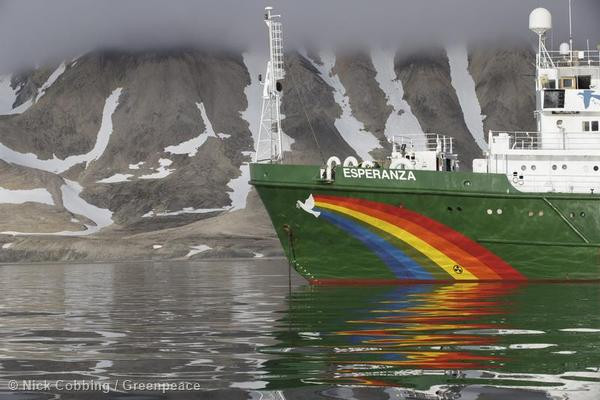Greenpeace Claims Victory as Controversial Norwegian Oil Exploration in Barents Sea Halted

A department of the Norwegian government has halted seismic testing in the Barents Sea, with environmentalists claiming the move as a victory for their campaign.
Greenpeace claims to have "exposed the testing programme", which mark the early stages of oil exploration, on Norwegian television on 17 August.
On Wednesday, the NGO's Esperanza ship caught up with the Norwegian Petroleum Directorate (NPD)'s Artemis Atlantic research vessel, after "chasing it" and "forcing it to change course".
Research from the Pew Institute shows that marine animals which depend on sound to navigate and feed "are incredibly vulnerable" to the noise pollution that stems from seismic testing, "in extreme cases it could cause physical damage or severe disorientation that can lead to stranding and death".
Having initially set out to test up to 7,000km of disputed territory (it is also claimed by Russia among other countries), the Artemis Atlantic retired after covering 5,600km. The operation was due to end on 15 September but finished almost one month early.
The official line from the NPD was that its decision to finish early had nothing to do with Greenpeace.
"That is not true," spokesperson for the directorate Eldbjørg Vaage Melberg told IBTimes UK. "It's got to do with the fact that we finished our programme far ahead of the timeframe we had. We had excellent weather this summer so the acquisition has been more efficient than expected. In addition, we had used our budget."
Greenpeace, on the other hand, argues that the coincidence was unlikely.
Commenting on the claims about excellent weather, Greenpeace spokesperson for Arctic ship tour, Juha Aromaa told IBTimes UK: "We only compare to the original plans that the directorate had for the programme. They left the northern-most area they were allowed to test untested. At least compared to the permission they had for seismic testing, they didn't do it in the whole area.
"On Sunday TV2 revealed the seismic testing programme. We'd been in touch and were involved in making it public. It's been a controversial topic in Norway and we believe the public concern which broke out from Sunday has been a factor in finishing the programme."
The seismic testing programme has caused some consternation in Norway. Opposition has come from the Norwegian Liberal Party and the Christian Democratic Party, with many claiming it contravened a government declaration which states that "petroleum activity shall not occur near the ice edge".
"Greenpeace believes the icy waters of the Arctic are far too vulnerable for oil activities, and are calling on Norway as well as other governments of the world to refrain from exploiting these costly resources, that the world cannot afford to burn if we are to avoid dangerous climate change," read a statement on the Greenpeace website.
The NPD said it had "no plans" to conduct more seismic testing but "that may change". It explained that typically, news of its activity appears on its website "five weeks" ahead of scheduled testing.
Earlier this week, Russia's state-owned oil giant Rosneft and Statoil of Norway began exploring for oil in the Barents Sea, despite the ongoing sanctions dispute between the two countries.
Rosneft is also to begin exploration off the north of Siberia along with US company ExxonMobil, the company said.
Greenpeace said the Esperanza is still sailing in the Svalbard Peninsula, where the Artemis Atlantic was intercepted, documenting seabirds at risk from Statoil and Rosneft joint drilling programme at Bear Island.
© Copyright IBTimes 2025. All rights reserved.





















